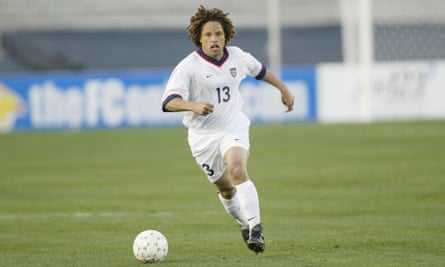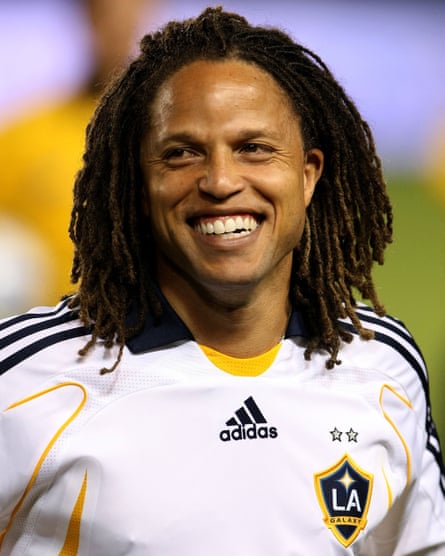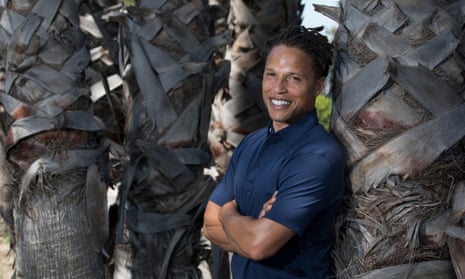Cobi Jones has no hesitation when asked why the United States’ most capped player would become the director of football at City of Angels FC, a fourth‑tier club founded by two Englishmen which has just finished second-bottom in the Southwest Conference.
“That’s my local area – it’s where I grew up,” he says of the Angels’ San Fernando Valley locale. “It was a no-brainer when approached. You have the instant heart palpitations, going: ‘Wow!’ It’s in my neighbourhood. This is what you dream about as a kid, especially here in the US. Because when I was growing up there was no opportunity to go beyond just the youth set-up.
“So to have the chance to help with something that can go beyond and have a direct access for kids and the opportunities that can be put before them is why I am doing this. The big issue is that PJ Harrison [the club’s co-owner] approached me about what he wants to get across and what he wants to do – that was extremely important for me.”
Jones is speaking in the LA office of the Italy World Cup winner Alessandro Del Piero, a friend of Harrison and the Angels’ other co-founder, Joe Sumner. It is next to Beverly Hills and when pointing behind him Jones indicates the Hollywood Hills, beyond which lies his Westlake Village childhood home.
As well as the coup of Jones, an esteemed figure in US soccer, accepting his position – which is unsalaried – the Angels’ tie-up with Epson, a global sponsor of Manchester United, means the 20-times champions of England are offering support.
José Mourinho’s squad are in LA at the start of their tour and on Sunday United’s coaches and former players, who may include Dwight Yorke, Denis Irwin, Bryan Robson and Mikaël Silvestre, will run a free clinic for youngsters in San Fernando’s Lake Balboa.
Harrison says: “For City of Angels to work with Man United is important in a few respects. Obviously they are a very credible club and trusted brand around the world – for any start-up company that type of support is really useful and it helps extend that trust into our club and brand.
“Spending the time talking to John Shiels, the CEO of the Manchester United foundation, working with the club, ex-players, current players and them investing into that and helping educate us, we can ensure the quality is there and debunk the myth that if its free, as the Angels is to join, it can’t be very good.
“To join a club in America is very expensive and your kid might not get in. Even with the $200-a-month fee they might not make it through the trials, so that’s a really weird barrier to entry. The money’s a big thing but then there’s also a lot of people in the Valley who are in a situation where their parents might not have a car. Without a car here it’s really tough as somebody has to get the bus or three buses so I think its going beyond the money [what we want to offer]. It’s figuring out ways we can get into the locality to somewhere they can access on foot. Or maybe through working with Uber, something like this, we can help them.”
Jones’s remarkable playing career was a triumph that overcame initial rejection at high school, university and national level. He played in the Premier League with Coventry City and had a short spell at Brazil’s Vasco de Gama before spending 11 years at LA Galaxy.
Jones represented the USA at the 1992 Olympics and the 1994, 1998, and 2002 World Cups. He amassed 164 caps and was voted into the Hall of Fame in 2011. Playing honours included the 2000 Concacaf Champions’ Cup and two MLS Cups with Galaxy, plus the 2002 Concacaf Gold Cup with the USA.
Jones was also previously assistant coach at the Galaxy – as well as taking charge of a game as the interim manager. Yet at 47 he sees his future as helping to grow the City of Angels, where he can bring his vast experience to an all-round role. “I am that reservoir that players can come to. If they have a feeling of ‘I want to do this’ there’s a pretty good likelihood that I’ve experienced it in some way. One thing I’d tell them is: ‘No road to success is ever easy.’ Everyone’s got a story.”

For Jones it was particularly difficult as he had to battle against racism. “There was a lot of adversity. I remember parents telling my parents: ‘Why is he playing soccer? Why do we have a black kid playing soccer? They already got all the other sports, why are they coming into this one?’
“At high school I was trying to make the [all-star] team and my coach told me that when all the coaches got together to vote [on selection] one had said I was the worst player he had ever seen. Going through college I wasn’t recruited. I was a walk-on [took a trial] at UCLA. Before I made the Olympic team I was cut twice and funnily enough the first coach I had at LA Galaxy was that coach.”
All of this makes it clear why Harrison, a creative director who has worked with Lauryn Hill, and Sumner, the son of Sting, are delighted to have Jones lead their club. A flick through the Angels manifesto reveals an edgy, outsider ethos firmly in the corner of those less privileged. The foundation statement’s final declaration reads: “We want our club to be something that people invest in emotionally, both from within the valley community and beyond.”
Jones says: “That was me week in week out playing games – my parents driving me all over town. So to give the opportunity for youth all the way up to have an avenue, the ability most importantly to play the game – if I can help out and try to give my knowledge, expertise and expand the options for kids in my area that’s a big point.”
City of Angels’ ranks include Byron Rivera, a 21-year-old striker whose nine goals in 12 games nearly claimed the Golden Boot in the 97-club, country-wide National Premier Soccer League. There is also Daniel Picado, a colourful 35-year-old former in-house photographer for Vivienne Westwood.
Harrison says: “He’s our centre-back and club photographer. He’s from Portugal and played second division in Portugal before moving to Brighton & Hove Albion. He then joined the Portuguese military and was a marine before moving to New York and taking up photography. He was talent-spotted there and given a job with Vivienne Westwood in Paris for five years. In between he took a psychology degree.
“Recruitment is definitely going to be enhanced by Cobi – player recruitment here is interesting. Obviously in England there are academies. Here people are in all different situations – they’re in high school, they only have the money for half a college scholarship, or they’ve been playing third division or in Albania. There’s all these kind of unattached players to pick from.”
City of Angels ended a first campaign that they only decided to participate in at the last moment with seven points from their 16-match conference, in which the longest trip is the five-hour drive to FC Arizona.

A 5-3 win over Temecula and 2-1 victory against Corinthians, plus a 2-2 draw with the latter, meant they avoided bottom place but league position is hardly the point. A club that will not be a year old until mid‑December has hit the ground running in its attempt to be an organic, long-term concern.
Ask Jones what success for City of Angels might look like in five years and he smiles. “It being stable. Growing a higher profile where people are talking about it. Looking to it as an example of what they could possibly do in their own regions. I’d love to see other former players do this in their home towns, where they grew up.
“I want to be involved from the ground. I want to have my influence on everything. I have an idea of how I like to see things go from youth academy all the way up. It sounds like a tacky line but let’s see how we can give back to the kids. Free options to play are important – this is LA yes, but not everybody has a ton of money. San Fernando [which has 1.8m people] is very culturally diverse, a huge Hispanic population, but from every walk of life. Look at myself – I’m like the mutt of everything. You have rich to poor, Hispanic, white, black, African American, Chinese, Japanese.
“You see games of soccer there every day of the week. During the day you see the kids play and in the evenings you see adults. If you go to certain areas you’ll see them playing in the streets and on rooftops – from soccer to futsal to everything.”
Jones is working with Harrison and Sumner on the club’s youth football and commercial interests. In October he will recruit players for the first-team squad, who are coached by Tyrone De Neal, who sometimes doubles up as goalkeeper. Then the club move into pre-season from November to January, before February’s opening games of the Angels’ second term.
Their home matches are played on the fenced grass practice field of the municipally owned LA Valley College. The ground holds only a few hundred but fans are pitchside and the aim is to move next door to the 6,000-capacity Monarch Stadium.
Of the Angels’ first home outing next season Jones says: “I’ll have a special tingle. And, I’ll get my mom and dad to drive down, too.”

Comments (…)
Sign in or create your Guardian account to join the discussion